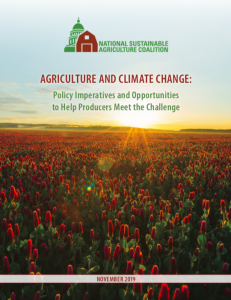Floods in the Midwest. Droughts on the West coast. The climate crisis has become impossible to deny as the havoc it causes becomes impossible to ignore. Very few groups of people are further out on the front lines of this than farmers. But often times the research being done to figure out the best practices farmers can implement to protect themselves from and help reverse climate change are humongous in quantity and heavy with detail and scientific jargon. But never fear, for The National Coalition of Sustainable Agriculture (NSAC) has published a comprehensive report entitled “Agriculture and Climate Change: Policy Imperatives to Help Producers Meet the Challenge.” The report itself is a nearly 80-page long behemoth, but here’s why farmers, policy makers, and even those outside of the agriculture industry should take a look at it.
This report has effectively synthesized the most relevant research that has been conducted on sustainable agricultural practices and climate change and turned it all into recommendations to help farmers produce food more sustainably in the midst of the climate crisis. About two hundred and thirty studies were analyzed and incorporated into this report. I think it’s safe to say that a single person taking on that job would have to be incredibly passionate about sustainable agriculture and also have a tremendous amount of time on their hands. Farmers may have the first attribute, but I’m willing to bet that very few, if any, have the second. The research that NSAC reviewed allowed them to discover that most of the greenhouse gases that the agricultural industry produces comes from the way that soil is managed on farms. However, managed correctly, the soil can actually become a carbon sink, or a place that carbon can be taken out of the atmosphere and stored. In this report, NSAC recommends that soil be covered (preferably with living things like plants) and undisturbed. It is also recommended that farmers diversify their crops, integrate livestock in their operations, and put organic residues back into the soil.
Another aspect that makes this report especially powerful is its dual focus on policy. Government policies often play a major role in influencing the kinds of methods farmers use because they can dictate what will be most financially legitimate. Without diving into the nitty-gritty details too much (hopefully this article will entice you to do that on your own), this report identifies eight policy priorities that have come out of the research that has been examined. These priorities are creating a national and international goal for increasing carbon storage in soils, increasing support for sustainable and organic ways of farming, supporting nutrient management that reduces nitrogen emissions, supporting composting, protecting sensitive and marginal lands for their carbon sequestration potential, stopping the subsidization of concentrated animal feeding operations and supporting sustainable livestock production, supporting energy conservation and renewable energy efforts on farms, and finally, designating more funding for the breeding of resilient plants and animals. These priorities may seem really ambitious, but a report like this that compiles all of them in one place can be a valuable tool for policy makers wondering how exactly to help the agricultural industry in the face of climate change.
So, for those wondering how agriculture or policy fit into the climate crisis, and how they can be used as tools to stop it, dive into this report. You won’t be sorry.

This report, published by the National Sustainable Agriculture Coalition, synthesizes a vast amount of scientific information for farmers and policy makers. (NSAC, 2019)
Article:
National Sustainable Agriculture Coalition. 2019. Agriculture and Climate Change: Policy Imperatives and Opportunities to Help Producers Meet the Challenge. Washington D.C.

Lauren Kageler
Great article! This post is sure to be a useful resource for any farmers or policy makers.